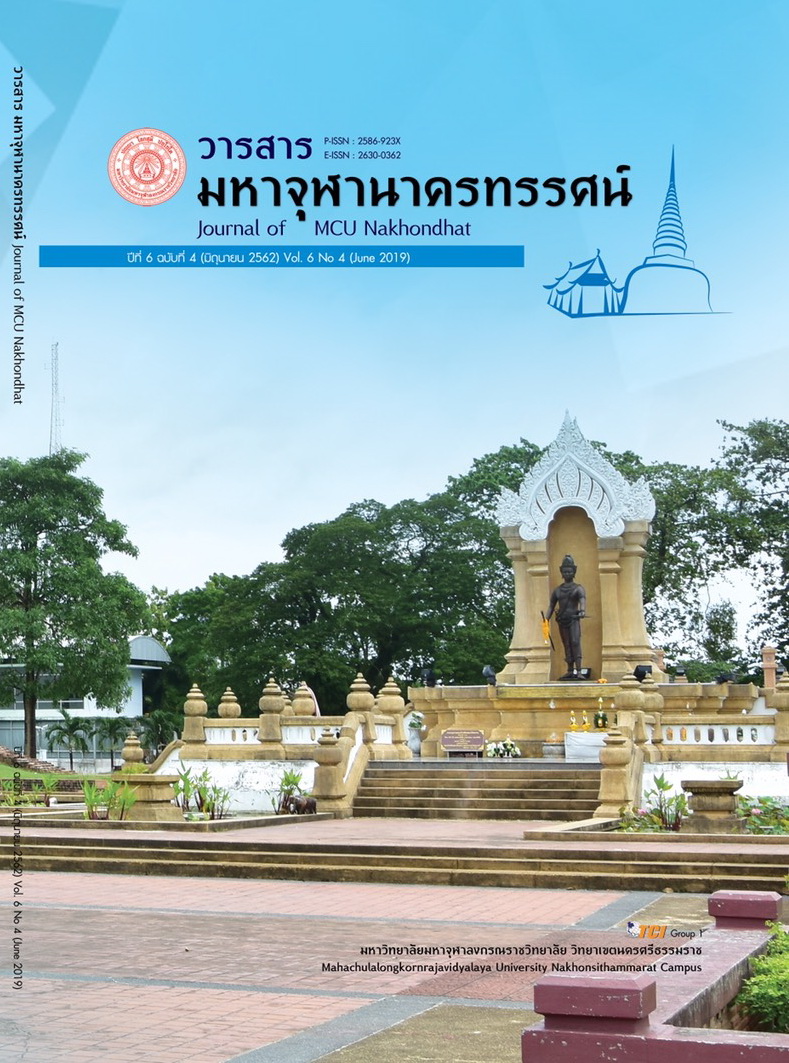AN APPLICATION OF BUDDHIST PRINCIPLE FOR DIABETIC PATIENT’S HAPPY LIVING OF BUDDHIST MONKS
Main Article Content
Abstract
The objectives of this thesis to study state of problems of diabetic patient’s living of Buddhist monks; to study the Buddhist principle for happy living and to study an application of Buddhist principle for diabetic patient’s happy living of Buddhist monks. The study was conducted by means of qualitative by field research and documentary research by linking data Buddhism in keeping with the life style of the monk patients with diabetes. Classification of data one given subject. Analysis and descriptive information compiled the data analysis and suggestions.
The research results found that;
the state of problems of diabetic patient’s living of Buddhist monks found that patients with diabetes have a problem in the clergy. The following three aspects: 1) physical health problems, such as fatigue, insomnia, do not have the strength, thirsty, drink more water, urine, incontinence, sweet appetite weight while eating. There are problems about weight control as well as complications 2) mental health problems, such as Distracted, lack of self-confidence, anxiety and moody. 3) problems in living with others in the society such as monks some necessary reduce the mission. In order not to disturb the folk magic due to the diet. To avoid certain foods and follow the doctor's advice. Eating with others is difficult. Some people experiencing religious practice. Inconvenience as before and especially about travel and food to control, while some still practice. The religious activity normally, but more careful about food. There are application of Buddhist principles in order to live happily according to Abhinhapaccavekkhana, Indriya-samvara and Bhojane-mattaññutā. There is also the introduction of Buddhism other deals, such as Tilakkhana or Sāmañña-lakkhana: the common characteristics, Adhitthāna dhamma: foundations on which a tranquil sage establishes himself, Khanti: forbearance, Viriya: energy, Apannaka-patipadā: sure course, Appamāda: heedfulness and the four Balas (powers).
Article Details
References
พระธรรมโมลี (ทองอยู่ ญาณวิสุทฺโธ). (2551). การศึกษาเชิงวิเคราะห์วิถีชีวิต พฤติกรรมสุขภาพ และการดูแลสุขภาพ แบบองค์รวมของพระสงฆ์ที่ปรากฏในพระไตรปิฎก. ใน ดุษฎีนิพนธ์พุทธศาสตรดุษฎีบัณฑิต สาขาพระพุทธศาสนา. มหาวิทยาลัยมหาจุฬาลงกรณราชวิทยาลัย.
มหาจุฬาลงกรณราชวิทยาลัย. (2539). พระไตรปิฎกภาษาไทยฉบับมหาจุฬาลงกรณราชวิทยาลัย. กรุงเทพมหานคร: โรงพิมพ์มหาจุฬาลงกรณราชวิทยาลัย.
แม่ชีภคพร ธรรมญาณี. (2559). ศึกษาแนวทางการใช้หลักอภิณหปัจจเวกขณ์ในการฝึกจิตผู้สูงวัย. ใน วิทยานิพนธ์พุทธศาสตรมหาบัณฑิต สาขาพระพุทธศาสนา. มหาวิทยาลัยมหาจุฬาลงกรณราชวิทยาลัย.
สุภีร์ ทุมทอง. (2553). ศึกษาการพัฒนาอินทรียสังวรในพระพุทธศาสนาเถรวาท. ใน วิทยานิพนธ์พุทธศาสตรมหาบัณฑิต สาขาพระพุทธศาสนา. มหาวิทยาลัยมหาจุฬาลงกรณราชวิทยาลัย.


